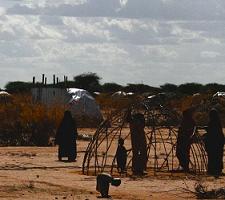
In December 2006, Ethiopia toppled Somalia's Islamic government, opening up another active front in the War on Terror. The Bush administration provided the invading troops with intelligence and diplomatic support, in an attempt to capture or kill three senior al-Qaeda operatives thought to be living under the protection of the Islamic regime. Despite U.S. air strikes aimed at the operatives, they remain at large, and Somali leaders contend that many civilians were killed by the attacks.
The invasion shattered a six-month period of peace secured by the Islamic government — which critics condemned as marked by Taliban-style rights abuses, but supporters praised as the longest period of normalcy since Somalia's 1991 revolution. The post-invasion government backed by the U.S. and Ethiopia has failed to control the country, resulting in widespread violence and a humanitarian crisis.
David Case traveled throughout the Horn of Africa to investigate the implications of the invasion for the War on Terror, and examine how the potential benefits to American security weigh against the impact of added turmoil in one of the world's most war-torn regions.



